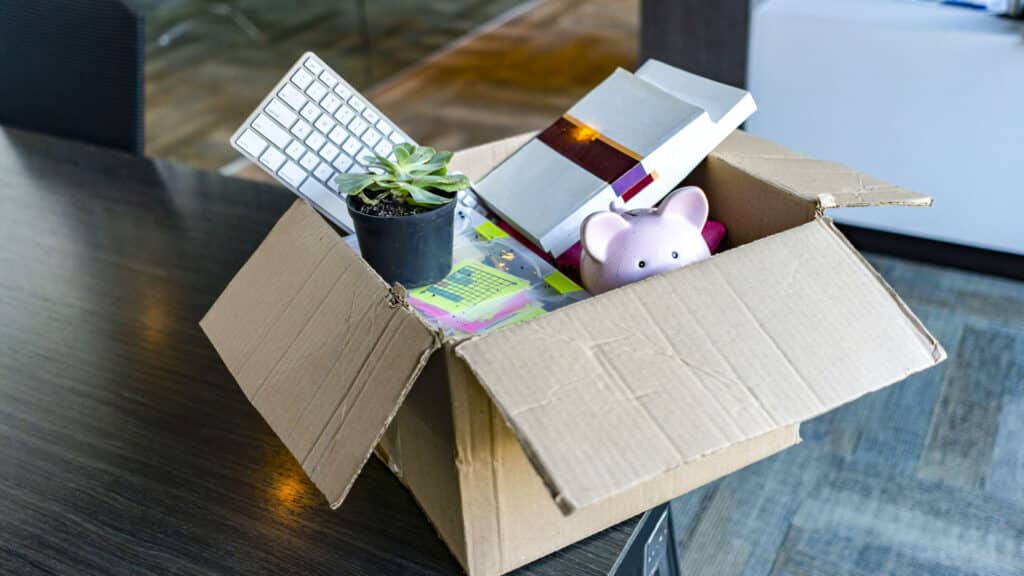Most products on this page are from partners who may compensate us. This may influence which products we write about and where and how they appear on the page. However, opinions expressed here are the author's alone, not those of any bank, credit card issuer, airline or hotel chain.
Call me cynical, but I’ve never bought into the idea of job stability. I saw nearly half of my neighborhood put up foreclosure signs during the Great Recession. Then I saw my friends lose jobs and have offers rescinded during the first months of the COVID-19 pandemic. What's more, I lost my dream job earlier this year without warning. I woke up on a Tuesday, fully prepared to finish a project that had been weeks in the making. Luckily, I had been financially preparing for a job loss since my first day. The layoff was a shock and a disappointment, but it wasn’t the end of the world.
Here are some tips to help you prepare financially before a job loss—or after experiencing one.
1. Put Savings on Autopilot
This is a habit I developed when I first started earning money from freelancing. I didn’t make much initially, but I always stashed away at least $20 per week in my savings account. That savings account was in a different bank than my checking account. I knew if I didn’t see it, I wouldn’t be tempted to spend it. Over time, I increased the amount I was saving.
Ways to automate your savings:
- Split your paycheck: This is when you have your paycheck sent to multiple accounts. Most employers let you do this directly in their payment management system.
- Set up automatic payments with your bank: You can schedule payments via online or mobile banking. If you're struggling with the technical aspect, you can also reach out to your bank's customer service.
When I started my most recent full-time job, I automated this process by sending my direct deposit to three accounts. Half went to my checking account, one-quarter went directly to my savings account, and one-quarter went into my Roth IRA for investments.
To boost your savings even more, consider stashing your earnings in a high-yield savings account.

Getting a Personal Loan When You’re Unemployed
2. Keep a Budget and Know Where to Make Cuts
Budgets are plans for your money. I recommend always keeping a budget, even if you’re in a position to splurge. When I am happily employed, my budget includes an amount for eating out at restaurants, taking trips with friends and saving up for big purchases.
When I got laid off, I looked at my budget to understand where I could save. I looked at where my money was going and created a new budget.
Here are some examples of budget adjustments I made:
- Instead of spending $400 at restaurants every month, I knew I'd be satisfied only going out to eat twice a week. That saved me about $200 per month.
- While I absolutely love traveling, I knew I could drive to closer destinations while I saved up credit card points to buy plane tickets. That alone saved me thousands.
Quick Tip
Don’t cut everything your love from your budget. Figure out what you’re willing to part with before making changes to balance what you absolutely need with a little something you enjoy.
 Related Article
Related Article
7 Personal Finance Apps for Saving, Budgeting & Investing on your Phone
3. Diversify Income With Freelancing
This is the pillar of my financial health and mental well-being. Knowing that I can pay my bills through freelance work keeps me from stressing out about layoffs or looking for a new full-time job when I have a job. Before signing an offer letter, I always ask recruiters about policies regarding freelancing while working. It’s important to me to keep at least one freelance client, even while I have a full-time job. It only takes me a few extra hours per week, and it keeps my freelance network alive.
When I learned that I was being laid off, I was able to reach out to my current and past clients for referrals to other projects. As a bonus, I also have something to put on my resume if it takes me longer than expected to find a new full-time job.
Almost anyone can find freelance work nowadays. Websites like Upwork and Fiverr are great for remote opportunities. If you prefer non-digital work, local Facebook groups and apps like Nextdoor are great for finding short-term gigs.
Side Hustle Ideas
There are also other side hustles you can do to supplement the lost income from a layoff:
- Food delivery driver: If you have some free time on nights and weekends, you could be in high demand as a food delivery driver. Companies like Uber Eats, DoorDash and Grubhub contract drivers to pick up and deliver takeout meals in most cities across the U.S. The best part? You can typically set your own hours and may even pick up some tips along the way.
- Rideshare driver: If transporting potentially messy meals isn’t your thing, you could still make some extra cash as a driver. Uber and Lyft are always looking for drivers. So if you’re a people person with an eligible vehicle, consider gigging as a rideshare driver during hours convenient to your schedule.
- Grocery delivery: Sites like Shipt and Instacart contract workers to shop for their users and deliver their orders. This type of work could be a great fit if you’re detail-oriented enough to comb through a shopper’s list with accuracy and like a little bit of exercise before you hop in the car to make your delivery.

19 Best Online Side Hustles You Can Do From Home (2024)

Financial Preparation Turns Layoffs Into Breakups
Layoffs are never easy, but being financially prepared keeps them from being overwhelming. Because I took care of my money when I was employed, it is now taking care of me. I have time to breathe, process the changes and look for a new job—without the anxiety of making ends meet.
If you’re worried about your job, the best thing you can do is look at what you’re willing to cut down on spending and save what you can (start with $20 per month!).
If you have the time, you can also diversify your income by offering your skills and services through apps and websites. Many freelance websites can help pad your bank account and tie you over when looking for a job.
















